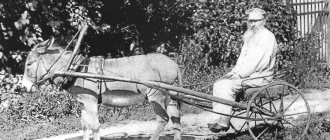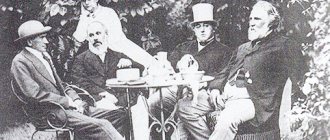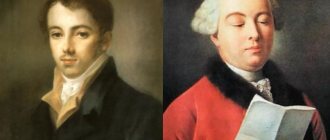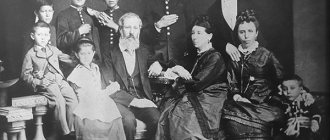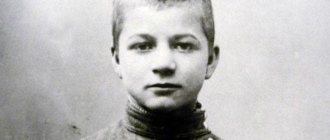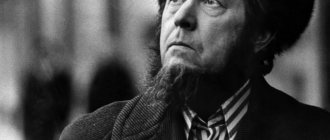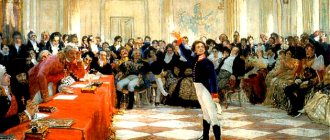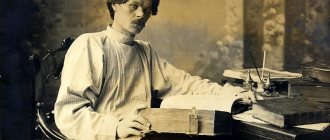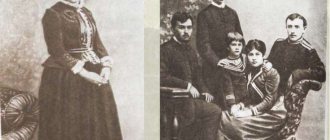Origin
Fyodor Dostoevsky himself claims to be a representative of the Russian people.
This is evidenced by the writer's autobiography. It cannot be otherwise, since the writer was born in Moscow, grew up in St. Petersburg, and even served his sentence in his native country. Only in later years did he begin to travel, having mastered Europe. However, researchers have found that Fyodor Mikhailovich’s roots are far from Russian and even Slavic in origin. The writer’s nationality is of Tatar origin; his ancestor was the Golden Horde warrior Aslan-Chelebi-Murza, who left the ranks of the khan and converted to Orthodoxy in 1389. The people called the son “Wide Mouth”, and all the other descendants were called the Rtishchevs. It was this surname that stuck to the family until 1506, when Danila Rtishchev, the founder of the Dostoevsky dynasty, was born. It is difficult to identify nationality, since Danila was originally from Pinsk district in Belarus, and his ancestors were both Tatars and Slavs.
This is interesting! Griboedov Woe from Wit - summary and chapter-by-chapter descriptions
Danila was awarded the title “Dostoev”, and the descendants, having already become Dostoevskys, were ranked among the Polish gentry. Later, this surname lost its title of nobility and was completely integrated with Polish-Lithuanian names. Further information about the surname is interrupted, and again the Dostoevskys emerge in Volyn (Ukraine). It was in this area that the grandfather of the Russian writer was born, who served in the Bratslav province. After the second partition of the Polish-Lithuanian Commonwealth, these lands became part of the Russian Empire, and the writer’s parents already bore the title of Russian nobles.
early years
The future author of famous novels was born in Moscow on October 30 (November 11) in 1821. The parents were representatives of the noble elite, and in addition to Fedor, the family had six more children. According to Wikipedia, the first sad event in Fyodor’s biography occurred when the future writer was only 16 years old - his mother died.
From that moment on, he and his older brother went to study at the boarding house named after K.F. Kostomarov to St. Petersburg, where he later lived most of his life. Fedor received his education at the Engineering School, but his main passion turned out to be philosophy and literature.
In the same year when the mother died, another tragedy occurred - Pushkin, the most beloved of writers, died in a duel. It is worth noting that it was this author, the “golden” classic and the face of Russian literature, who had a huge influence on the formation of not only Fyodor Mikhailovich’s further work, but also on his worldview.
The beginning of a creative journey
Creative biography begins in 1844. It was at this time that Fyodor Mikhailovich wrote his first novel, “Poor People.” The work was received with a bang by both the public and critics, thanks to which the personality of the young author became popular and recognizable. Moreover, we emphasize that during this period Fyodor Mikhailovich met Belinsky and Nekrasov, and also became a member of the informal literary community.
The next creation, the novel “The Double,” encountered unimaginable criticism. He was not accepted in the literary community, and ordinary readers did not even understand the essence of the events described.
This is interesting! The story Heart of a Dog: read the summary chapter by chapter
Fyodor Dostoevsky: first steps in literature
At the beginning of the same year, Dostoevsky worked on the novel “Poor People”, and completed it at the end of May 1845. Nekrasov and Belinsky looked at the manuscript and were delighted: a genius was born. Dostoevsky began to spend a lot of time in Belinsky’s circle until he created a new work, “The Double,” whose innovation almost no one appreciated. At the end of 1846, the author finally fell out with the editors of Sovremennik, represented by Nekrasov, and moved to Kraevsky’s Otechestvennye zapiski. And from the end of winter 1846, Dostoevsky became a member of the literary and philosophical circle of the Beketov brothers, where he subsequently found true friends and believed in himself again, thanks to which in the future he wrote a number of works in various genres:
- "A Novel in Nine Letters";
- "Petersburg Chronicle";
- "Mr. Prokharchin";
- "Crawlers";
- "Honest Thief";
- "Another man's wife";
- "Jealous husband";
- "Christmas tree and wedding";
- "Mistress"
- "Weak heart";
- "Little Hero";
- "Uncle's Dream";
- "The village of Stepanchikovo and its inhabitants."
Arrest and a new stage of life
Let’s try to talk about this period briefly, but it’s worth noting right away that it was the arrest and subsequent hard labor that became not just a turning point in the writer’s life, but literally a new birth of a creative and mental personality. It is very difficult to study this period of time in full, so we will note the most important thing, and also below in the table we will provide dates that have become very significant for the author.
On December 22, 1849, Fyodor Mikhailovich was sentenced to death in the Petrashevsky case. It is easy to assume that before his impending death, the person began to see everything in a completely different light, but the sentence was changed to a more merciful one - hard labor. In subsequent years, Dostoevsky poured out all his thoughts, experiences and considerations in Myshkin’s monologue in the novel “The Idiot.”
In the period from 1850 to 1854, he served his sentence in Omsk, and therefore his work was suspended. New stories in Dostoevsky's life begin after his release and joining the ranks of the soldiers of the seventh linear Siberian battalion. There he makes acquaintance and friendship with Chokan Valikhanov, a famous ethnographer and traveler, and also begins an affair with the wife of an official on special assignments, Maria Isaeva.
Soon, the husband of Fyodor Mikhailovich’s mistress dies, and he marries his beloved, and also accepts her son from his first marriage. Together they move to St. Petersburg, and there he gets a job at the magazine “Time” and “Epoch” along with his brother.
Option 2
On November 11, 1821, the great classic, writer and thinker Fyodor Mikhailovich Dostoevsky was born. Since childhood, the future writer suffered from epilepsy. There were 7 children in the family, Fedor was born second, he had 3 brothers and 3 sisters. Mother Maria Feodorovna dies of tuberculosis in 1837. After her death, her father sent his two children Fyodor and Mikhail to study at the St. Petersburg School with a military engineering profile. In 1839 the father dies.
From a young age, the future classic was interested in writing, constantly reading the works of Pushkin, Shakespeare, Lermontov, Schiller, Corneille, Gogol, Balzac, Gogol. In 1843, Fyodor Mikhailovich was so impressed by the work “Eugene Grande” by O. Balzac that he undertook its translation.
The years 1844-1845 are considered to be the beginning of the writer’s creative career. The work “Poor People” is the writer’s very first work. After the publication of the novel, the writer gained fame and popularity. Belinsky V.G. and Nekrasov N.A. highly appreciated the work of the aspiring writer.
The second work of Fyodor Mikhailovich, work on which lasted from 1845 to 1846, is the story “The Double,” which was subjected to severe criticism by many writers, as well as readers of the literary magazine. At the beginning of his creative career, all of the writer’s works were published only in his brother’s magazine.
The year 1849 becomes a crisis year for the writer; he was sentenced by the court for participating in a circle with a revolutionary mood. Soon the punishment was replaced by hard labor for a period of 4 years in the Omsk fortress. After the end of his punishment, the writer is sent to military service as a soldier. After the events he experienced at hard labor and during his service, the young writer’s worldview completely changed, he became more devout. While serving, the writer meets Maria Isaeva, the wife of a former official, and a romance begins between them. After the death of her husband, Maria married Fyodor Mikhailovich in 1857. Soon the young family moved to live in the city of St. Petersburg to work with his brother Mikhail in the magazines “Time” and “Epoch”.
The year 1864 becomes very tragic for the classic, his wife and brother die. After these losses, Fyodor Mikhailovich begins to play roulette and accumulates numerous debts. During this difficult period of his life, he worked on the novel “Crime and Punishment”, then on the novel “The Player”, for which he hired stenographer Anna Sinitkina, who soon became his wife.
The second wife Anna was 25 years younger than her husband. After the wedding, he entrusted her with all his financial affairs. In their marriage they had 4 children. In 1869, the writer finished working on the novel “The Idiot”; in one of Prince Myshkin’s monologues, previously experienced emotions before his execution are displayed. The period from 1871 to 1881 is considered the most fruitful for the writer’s work; he wrote the following works: “A Writer’s Diary”, “Bobok”, “Teenager”, “The Dream of a Funny Man”, “The Collapse of Baimakov’s Office”, “The Brothers Karamazov” and others.
Time of Decline
In 1864, Fyodor Mikhailovich’s brother and wife died simultaneously. The characteristics of this period are the darkest and most difficult, since after the death of loved ones the author becomes depressed and also begins to lose his fortune in a casino. Having lost most of his savings, he finds himself broke, but, as it turned out later, this stage became another new start in his work.
While in debt, the author wrote his most popular novel, Crime and Punishment. In it, he not only reflected the essence of Raskolnikov’s sinful soul, but also veiledly presented interesting facts from life that happened to him at the moment of his decline.
This masterpiece was followed by a less popular, but very entertaining novel, The Gambler. Dostoevsky himself no longer had the strength to type, so he hired a stenographer, Anna Snitkina, who completed the work in 21 days. Subsequently, Fyodor Mikhailovich married her, and they went abroad together.
This is interesting! Roman Oblomov: a summary of the work in chapters
Further work of Dostoevsky
Let us briefly describe other works of this writer. In 1866, a novel entitled “Crime and Punishment” appeared, which is considered one of the most significant in his work. In 1868, The Idiot was published, a novel in which an attempt was made to create a positive hero who confronts a predatory, cruel world. In the 70s, the work of F.M. Dostoevsky continues. Novels such as “Demons” (published in 1871) and “The Teenager,” which appeared in 1879, became widely known. "The Brothers Karamazov" is a novel that became the last work. He summed up Dostoevsky's work. The years of publication of the novel are 1879-1880. In this work, the main character, Alyosha Karamazov, helping others in trouble and alleviating suffering, is convinced that the most important thing in our life is a feeling of forgiveness and love. In 1881, on February 9, Dostoevsky Fyodor Mikhailovich died in St. Petersburg.
The life and work of Dostoevsky were briefly described in our article. It cannot be said that the writer was always interested in the problem of man above all others. Let's write briefly about this important feature that Dostoevsky's work had.
Life outside Russia
During his trip to Europe, he painstakingly worked on a unique work - “The Idiot”. It is believed that this novel is not like all the others, since it does not touch on religion, politics or love, but describes the simplest truth - “The road to hell is paved with good intentions.”
Also, being far from his homeland, the author begins to create the most political work called “Demons”. In it, he sheds light on the coming Red Revolution, calling communists demons and white liberals fathers. At the same time, he is working on the creation of such novels as “Teenager” and “The Brothers Karamazov”, which became the author’s last creation.
Interesting fact! Dostoevsky's biography formally fell on the Tsarist years. But he, like any philosopher, was a bit of a prophet and was able to accurately predict the coming of the communists and the overthrow of the emperor. Lenin nicknamed the writer “arch-nasty”, since in his novel “Demons” he used this very term to call the Bolsheviks.
In 1881, Fyodor Mikhailovich dies of emphysema, having previously quarreled with his sister over an inheritance. Despite the fact that the writer did not live long, he left behind spiritual food for at least 300 years to come. Most philosophers and writers, both domestic and foreign, still draw knowledge and inspiration from the works of Dostoevsky.
Arrest and hard labor
In 1846, an event occurred in Dostoevsky’s biography that influenced his entire subsequent life. He met M.V. Petrashevsky, who was the organizer of the so-called “Fridays”.
“Fridays” were meetings of like-minded people, at which participants criticized the actions of the king and discussed various laws. In particular, questions were raised regarding the abolition of serfdom and freedom of speech in Russia.
At one of the meetings, Fyodor Mikhailovich met the communist N.A. Speshnev, who soon formed a secret society consisting of 8 people.
This group of people advocated a coup in the state and the formation of an underground printing house.
In 1848, the writer published another novel, “White Nights,” which was warmly received by the public, and in the spring of 1849 he, along with the rest of the Petrashevites, was arrested.
They are charged with attempting a coup. For about six months, Dostoevsky was kept in the Peter and Paul Fortress, and in the fall the court sentenced him to death.
Fortunately, the sentence was not carried out, because at the last moment the execution was replaced by eight years of hard labor. Soon the king softened the punishment even more, reducing the term from 8 to 4 years.
After hard labor, the writer was called up to serve as an ordinary soldier. It is interesting to note that this fact from Dostoevsky’s biography became the first case in Russia when a convict was allowed to serve.
Thanks to this, he again became a full citizen of the state, having the same rights that he had before his arrest.
The years spent in hard labor greatly influenced the views of Fyodor Dostoevsky. Indeed, in addition to grueling physical labor, he also suffered from loneliness, since ordinary prisoners at first did not want to communicate with him because of his noble title.
In 1856, Alexander 2 came to the throne (see interesting facts about Alexander 2), who amnestied all Petrashevites. At that time, 35-year-old Fyodor Mikhailovich was already a fully formed personality with deep religious views.
Life stages
In order to clearly look at the main dates of the writer’s life, we decided to compile a table. It will feature both creative moments and personal ones. After all, as we have already understood, it was his personal life that had a huge influence on Fyodor Mikhailovich’s worldview, which was reflected in his novels.
| 1821 | Birth in Moscow on Novaya Bozhedomka |
| 1837 | Death of mother, murder of Pushkin |
| 1839 | Father's death |
| 1844 | A translation of Dostoevsky's novel by Balzac "Eugenia Grande" has been published |
| 1845 | Novels "Poor People" and "The Double" |
| 1847 | Dostoevsky becomes a member of Petrashevich's literary circle |
| 1848 | Novel "White Nights" |
| 1849 | Arrest and sentence |
| 1850 | Arrival in Omsk prison |
| 1854 | Joining the ranks of soldiers in the Semipalatinsk battalion |
| 1857 | Wedding with Isaeva |
| 1859 | Return to St. Petersburg |
| 1860 | Novel "Notes from a Dead House" |
| 1863 | Release of the series “Winter Notes on Summer Impressions” |
| 1864 | Death of the writer's wife and brother |
| 1866 | Novel "The Player" |
| 1867 | Marriage to Anna Snitkina |
| 1868 | Publication of the novel “The Idiot” |
| 1869 | Birth of daughter Lyuba |
| 1871 | Birth of son Fedor |
| 1872 | Novel "Demons" |
| 1875 | Novel "Teenager" |
| 1880 | Novel "The Brothers Karamazov" |
| 1881 | Death and burial of Dostoevsky |
The chronological table of Dostoevsky makes it possible to familiarize yourself with the dates of the most important events in his life. There are no premises, no conclusions, there are only facts. But only his literature, works and achievements can give a much more detailed and correct description of Dostoevsky’s personality. They fully reflect not only the writer’s inner world, but also the reality in which he lived.
Important! It is Fyodor Mikhailovich who is considered the most realistic and believable writer in Russian literature.
Brief biography of Dostoevsky
4.6
(10)
Fyodor Mikhailovich Dostoevsky (1821-1881)
Fedor Mikhailovich Dostoevsky
Fyodor Mikhailovich Dostoevsky was born in Moscow on November 11 (October 30), 1821 in the family of a doctor. His father, Mikhail Andreevich, was the son of a priest and came from an old Lithuanian family. But in his youth he broke up with his family and came to Moscow, where he graduated from the Medical-Surgical Academy. For his further merits, M. A. Dostoevsky received the right to hereditary nobility.
Maria Fedorovna, the writer's mother, came from the Nechaev merchant family. Unlike the writer’s gloomy, despotic father, his mother had a cheerful character, read a lot, sang, and played the guitar well.
The family lived in a wing of the hospital for the poor, where the father worked. Fyodor often talked with patients who were walking in the garden. He was drawn to these unfortunate people, although his parents forbade such communication. Dostoevsky's first teachers were his parents and visiting teachers.
In 1833 he was sent to the half-board of the Frenchman Suchard (N.I. Drashusov), and in 1834 to the boarding house of L. Chermak, where much attention was paid to the study of literature.
After the death of his mother in the spring of 1837, his father took his two eldest sons, Mikhail and Fyodor, to St. Petersburg. In January 1838, Fedor, according to his father’s will, entered the Main Engineering School, although even then he dreamed of devoting himself to literature.
Studying conscientiously, Fyodor simultaneously enthusiastically studied literature, history, drawing, and architecture. During these years, Dostoevsky first tried to engage in artistic creativity.
The news of his father's death shocked the young man and provoked his first seizure of epilepsy, from which Dostoevsky suffered for the rest of his life.
In 1843, Fyodor Mikhailovich graduated from college and was appointed to the engineering department. However, a year later he retired to completely immerse himself in literary creativity.
In 1846, the novel “Poor People” was published in the “Petersburg Collection”, which made the name of Dostoevsky widely known among the reading public. The novel marked the beginning of a whole series of works, the plots of which were based on the life stories of various segments of the population of St. Petersburg.
In 1846, Dostoevsky met M.V. Butashevich-Petrashevsky, and from 1847 he constantly attended his “Fridays”. At their meetings, the Petrashevites discussed philosophical and socio-economic issues, developed a program for the democratic transformation of Russia, including the abolition of serfdom.
On the night of April 22-23, 1849, Dostoevsky and other Petrashevsky members, by personal order of Nicholas I, were arrested and placed in the Peter and Paul Fortress. The writer spent almost nine months in the dungeons of the Alekseevsky ravelin.
On December 22, 1849, on the Semenovsky parade ground, a ritual of preparation for the death penalty was performed on the Petrashevskyites, but at the last minute, Dostoevsky’s sentence was changed to four years of hard labor and eternal soldiery, which he served in the Omsk convict prison and the Siberian linear battalion NQ 7 in Semipalatinsk .
During these years there was a reassessment of the writer's previous worldview. Dostoevsky was full of doubts and constant search. The only things that remained unchanged were deep sympathy for the disadvantaged and a craving for literary creativity, which was strictly prohibited.
When Dostoevsky was in military service, he managed to achieve first the rank of non-commissioned officer, and then an officer. He regained his rights of nobility and permission to write.
In 1857, Dostoevsky married the widow M.D. Isaeva and began to seek his resignation. He actively tried to return to literature. The publication of the stories “Uncle’s Dream” and “The Village of Stepanchikovo and Its Inhabitants” meant that Dostoevsky again believed in himself and was ready to create new works.
In May 1859, news arrived that Dostoevsky was “resigning from service due to illness” and was leaving for Tver in June, where he was allowed to settle. He was able to return to St. Petersburg at the end of 1859.
The first major work after his return was a novel (“Humiliated and Insulted,” published in 1861 in the magazine “Time.” At the same time, “Notes from the House of the Dead” was published, which reflected the impressions received in hard labor.
In 1864, Dostoevsky began publishing the magazine “Epoch”. In the same year, the explorer’s wife and elder brother died. The magazine was not popular with readers, and in 1865 its publication ceased.
In 1866, Dostoevsky married his stenographer Anna Grigorievna Snitkina. Period from 1867 to 1871 they spent abroad fleeing creditors. They were able to return to St. Petersburg only when the debts were partially repaid.
At the end of the 1860s - in the 1870s. such works as “Crime and Punishment”, “The Idiot”, “Demons” were written. The result of the writer’s work was the novel “The Brothers Karamazov,” on which Dostoevsky worked for the last two years of his life.
At the end of 1879, doctors diagnosed Dostoevsky with progressive lung disease and advised him to avoid physical activity.
A writer who always works at night, trying to reach a pen that had fallen on the floor, moved a heavy shelf, which caused a throat bleed. The disease worsened sharply. On the morning of January 28, 1881, the writer said to his wife: “... I know that I must die today!”
He died at 8:38 am.
4.6 / 5. 10
.
